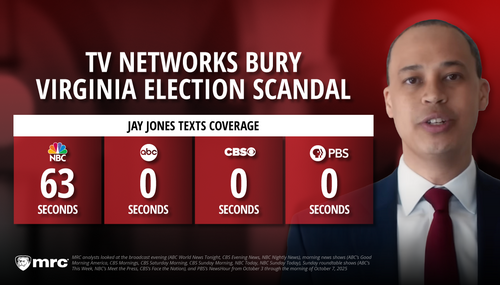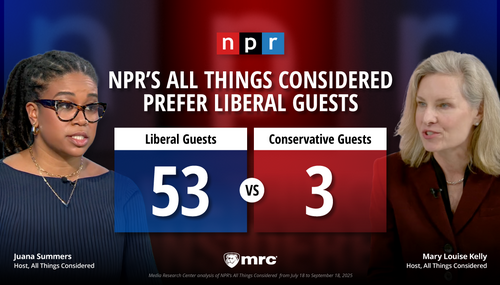
Gardner was prompted to flesh out his strongly-worded complaint by an April 7 Raddatz article at ABCNews.com entitled "Surprising Political Endorsements By U.S. Troops.":
Why not “Government Employees Cannot Participate in Partisan Political Activity”? Or how about government employees are not allowed to state who they support politically? How about government employees are NOT allowed to vote? How about UNION government employees are not allowed to vote?
Gardner went on to quote an excerpt in which Raddatz equated servicemen expressing "their personal endorsements" -- that is telling people for whom they plan to vote -- to engaging "in partisan political activity" which "the military is not supposed" to do.
Gardner called Raddatz on the absurdity of her statement:
Substitute the sub-class of government employees with members of the military and you see a First Amendment fight in the making. Somehow this reporter got the idea that military members are neutered politically. Um, no. Joining the military does NOT mean you support the ruling party, nor are you a Republican.
I’ve rewritten what follows about 20 times to be objective. The bigotry in the reporting above stands alone – though I doubt the author Martha Raddatz understands the grave insult she has made.
OTB blogger/editor James Joyner added an update in which he cited the legal opinion of an Army JAG officer about what military folks can and cannot do in terms of expressing political opinion. Simply put, Raddatz needs to do her homework:
As to the legal issues, uniformed military personnel operate under different rules than the civil service. The Fort Gordon, Georgia JAG has written a good synopsis:
[...]
Soldiers on Active Duty May:
1. Register, vote, and express their opinions on political candidates and issues, but not as representatives of the Armed Forces;
2. Attend partisan and nonpartisan political meetings or rallies as spectators, however, they may not attend: (a) in uniform, (b) during duty hours, (c) when violence is likely to result, or (d) when their activities constitute a breach of law and order;
3. Make monetary contributions to a political organization, but not to other members of the Armed Forces on active duty or employees of the Federal Government, and subject to the following:
a. 18 U.S.C. § 607 prohibits anyone “receiving any salary or compensation for services from money derived from the Treasury of the United States” to solicit a political contribution from any other such person;
b. 18 U.S.C. § 603 prohibits officers and employees of the Federal Government, and anyone “receiving salary or compensation for service from money derived from the Treasury of the United States” from making a political contribution to any other such person who is the “employer or employing authority” of the contributor;
1). This prohibits both contributions to the individual and to the individual’s campaign committee, but does not prohibit contributions to political parties;
2). In 1991, the Counsel to the President issued an opinion that this statute “may prohibit any Federal employee from contributing to the authorized campaign committee of the President;”
4. May encourage other military members to vote;
5. Serve as an election official, if such service (a) is not in uniform, (b) does not interfere with military duties, and (c) has the prior approval of the installation commander;
6. Sign a petition for legislative action or to place a candidate’s name on the ballot, but only in the soldier’s personal capacity;
7. Write a letter to the editor expressing personal views, and place bumper stickers on cars (but not large banners or posters).
Soldiers on Active Duty May Not:
1. Use their official authority or influence for interfering with an election, soliciting votes for a particular candidate or issue, or requiring or soliciting political contributions from others;
2. Participate in partisan political management, campaigns, or conventions;
3. Write and publish partisan political articles that solicit votes for or against a partisan political party or candidate, speak before partisan political gatherings, or participate in partisan political radio or television shows;
4. Serve in any capacity or be listed as a sponsor of a partisan political club;
5. Distribute partisan political literature or conduct a political opinion survey under the auspices of a partisan political group;
6. Use contemptuous words against the President, Vice President, Congress, the Secretaries of the military departments, Defense, or Transportation, and the Governors or legislatures of any state or territory where the soldier is on duty;
7. Engage in fund-raising activities for partisan political causes on military reservations or in Federal offices or facilities;
8. Attend partisan political events as official representatives of the Armed Forces.
RELATED: See Brent Baker's earlier blog post on Raddatz's April 7 "World News" story here.




